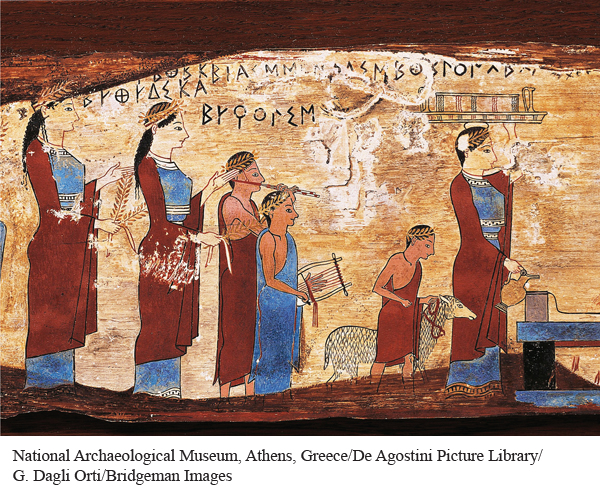A History of Western Society: Printed Page 60
A History of Western Society, Value Edition: Printed Page 55
A History of Western Society, Concise Edition: Printed Page 61
Introduction for Chapter 3
3
The Development of Greek Society and Culture
ca. 3000–338 B.C.E.
Humans came into Greece over many thousands of years, in waves of migrants whose place of origin and cultural characteristics have been the source of much scholarly debate. The first to arrive were hunter-
Although geographic conditions made farming difficult and limited the growth of early kingdoms, the people of ancient Greece built on the traditions and ideas of earlier societies to develop a culture that fundamentally shaped the intellectual and cultural traditions of Western civilization. They were the first to explore many of the questions about the world around them and the place of humans in it that continue to concern thinkers today. Drawing on their day-
The history of the Greeks is divided into three broad periods: the Helladic period, which covered the Bronze Age, roughly 3000 B.C.E. to 1200 B.C.E.; the Hellenic period, from the Bronze Age Collapse to the death in 323 B.C.E. of Alexander the Great, the ruler of Macedonia, which by that point had conquered Greece; and the Hellenistic period, stretching from Alexander’s death to the Roman conquest in 30 B.C.E. of the kingdom established in Egypt by Alexander’s successors. This chapter focuses on the Greeks in the Bronze (Helladic) Age and most of the Hellenic period, which is further divided into the Dark Age, the Archaic age, and the classical period. Alexander’s brief reign and the Hellenistic world are the subject of Chapter 4.▪

CHAPTER PREVIEW
How did the geography of Greece shape its earliest kingdoms, and what factors contributed to the decline of those kingdoms?
What was the role of the polis in Greek society?
What were the major wars of the classical period, and how did they shape Greek history?
What were the lasting cultural and intellectual achievements of the classical period?
Chronology
| 3000 B.C.E. | Bronze tools and weapons become common in Greece |
| ca. 1900 B.C.E. | Minoan culture begins to thrive on Crete |
| ca. 1650 B.C.E. | Mycenaean culture develops in Greece |
| ca. 1300–1100 B.C.E. | “Bronze Age Collapse”; migration, destruction |
| ca. 1100–800 B.C.E. | Dark Age; population declines; trade decreases; writing disappears |
| ca. 800–500 B.C.E. | Archaic age; rise of the polis; Greek colonization of the Mediterranean; Homer and Hesiod compose epics and poetry |
| ca. 750–500 B.C.E. | Sparta expands and develops a military state |
| ca. 600–500 B.C.E. | Political reforms in Archaic Athens |
| ca. 600–450 B.C.E. | Pre- |
| 500–338 B.C.E. | Classical period; development of drama, philosophy, and major building projects in Athens |
| 499–479 B.C.E. | Persian wars |
| 431–404 B.C.E. | Peloponnesian War |
| 427–347 B.C.E. | Life of Plato |
| 384–322 B.C.E. | Life of Aristotle |
| 371–362 B.C.E. | Thebes, with an alliance of city- |
| 338 B.C.E. | Philip II of Macedonia gains control of Greece |